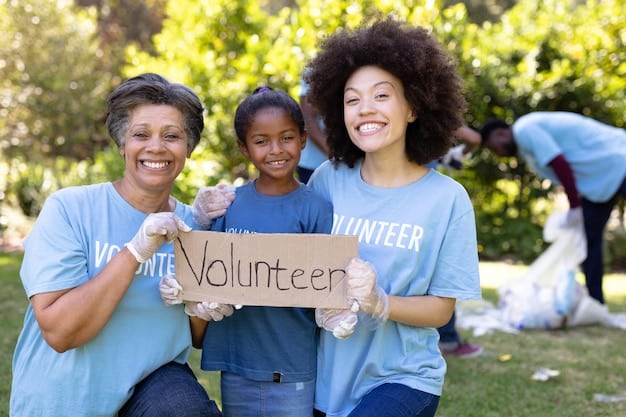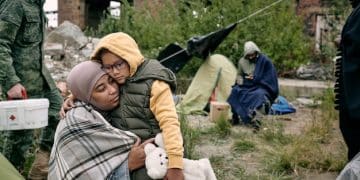US Citizens Volunteering Abroad: Legal Protection and Insurance Guide

US Citizens Volunteering Abroad: A Guide to Legal Protections and Insurance Through International Aid Organizations offers crucial information about safeguarding volunteers through legal frameworks, insurance policies, and best practices, ensuring their safety and well-being while contributing to international aid efforts.
Planning to volunteer abroad? This comprehensive guide, US Citizens Volunteering Abroad: A Guide to Legal Protections and Insurance Through International Aid Organizations, ensures you’re protected and prepared for your international service.
Understanding the Landscape of International Volunteering
International volunteering offers US citizens a chance to contribute to global communities while broadening their perspectives and skills. However, it’s essential to understand the legal and safety aspects to ensure a secure and impactful experience.
Why Legal Protections Matter
Legal protections are crucial for US volunteers abroad. They provide a framework for addressing potential issues, such as accidents, injuries, or disputes with host organizations.
These protections can range from basic rights under local laws to specific agreements negotiated by international aid organizations to safeguard their volunteers.
- Liability Coverage: Ensuring you’re covered for any unintentional harm caused to others while volunteering.
- Accident Insurance: Protecting you in case of injuries sustained during your volunteer work.
- Legal Assistance: Having access to legal support if you encounter legal troubles in your host country.

Understanding the legal framework in your host country is vital. Researching local laws and regulations can help you avoid legal pitfalls during your stay.
Navigating Legal Frameworks for US Volunteers
When volunteering abroad, US citizens are subject to both US and international laws, as well as the laws of the host country. Navigating these legal frameworks requires awareness and preparation.
US Laws and International Treaties
US laws, such as the Foreign Corrupt Practices Act (FCPA), may apply to volunteers working with organizations that receive US funding. Volunteers should be aware of these regulations to avoid inadvertent violations.
Additionally, international treaties and agreements can impact the legal status of volunteers, especially in areas of human rights and labor standards.
Host Country Laws and Regulations
The laws of the host country have the most direct impact on volunteers. These laws govern various aspects of life, including residency, employment, and criminal conduct.
- Visa Requirements: Understanding the correct type of visa and its conditions is crucial for legal residency.
- Labor Laws: Familiarize yourself with local labor laws to ensure fair treatment and avoid exploitation.
- Cultural Norms: Respecting local customs and traditions can help prevent misunderstandings and legal issues.
Engaging with local legal experts or organizations familiar with volunteer rights can provide additional support and guidance.
The Role of International Aid Organizations
International aid organizations play a vital role in protecting US volunteers abroad. These organizations often have established protocols and resources to ensure the safety and well-being of their volunteers.
Insurance Coverage for Volunteers
Many reputable aid organizations provide comprehensive insurance coverage for their volunteers, including health, accident, and liability insurance. Reviewing the policy details is essential to understand the extent of coverage.
Additionally, understanding the terms and conditions of the insurance policy can help you navigate potential claims and seek appropriate medical care if needed.
Emergency Support and Evacuation
In case of emergencies, aid organizations provide support and evacuation services. These services can include medical assistance, security support, and repatriation to the US.
- Emergency Hotlines: Access to 24/7 emergency hotlines for immediate assistance.
- Evacuation Plans: Clear procedures for evacuation in case of political instability or natural disasters.
- Medical Support: Assistance in accessing medical care and coordinating with healthcare providers.
Choosing an organization with robust emergency support and evacuation plans is crucial for your safety and peace of mind.

Insurance Policies and Coverage
Adequate insurance coverage is a cornerstone of volunteer safety. Understanding the different types of insurance policies and their coverage can help you make informed decisions.
Health Insurance Options
Health insurance is essential for covering medical expenses in case of illness or injury. Options can range from supplemental travel insurance to comprehensive international health plans.
Consider factors such as coverage limits, pre-existing conditions, and access to local healthcare providers when selecting a health insurance plan.
Liability Insurance
Liability insurance protects you from financial losses if you are held responsible for causing harm to others or damage to property. This coverage is particularly important if you are involved in activities with inherent risks.
- Personal Liability: Covering claims arising from unintentional harm caused to third parties.
- Professional Liability: Protecting volunteers in roles such as medical or educational services.
- Property Damage: Covering damages to property caused by the volunteer.
Reviewing the policy exclusions and limitations is crucial to ensure that you are adequately protected for your specific volunteer activities.
Due Diligence and Organizational Vetting
Before committing to a volunteer opportunity, it’s essential to conduct due diligence on the organization. Vetting the organization can help you assess its legitimacy, financial stability, and commitment to volunteer safety.
Checking Credentials and Reputation
Verify the organization’s registration status, accreditation, and affiliations with reputable bodies. Look for testimonials and reviews from past volunteers to gain insights into their experiences.
Checking the organization’s financial records and transparency can help ensure that it operates ethically and responsibly.
Assessing Safety Protocols
Inquire about the organization’s safety protocols, risk management procedures, and emergency response plans. Ask about training and support provided to volunteers.
- Risk Assessments: Reviewing risk assessments conducted for the volunteer placement.
- Safety Training: Ensuring volunteers receive adequate training on safety procedures and risk mitigation.
- Emergency Contacts: Having access to emergency contact information for on-site and off-site support.
By thoroughly vetting the organization, you can minimize your risk and maximize your chances of a safe and rewarding volunteer experience.
Best Practices for Maximizing Safety
Beyond legal protections and insurance, adopting personal safety practices can significantly enhance your safety while volunteering abroad. These practices include awareness, communication, and risk management.
Staying Informed and Aware
Keep up-to-date with local news and developments, monitor travel advisories issued by the US State Department, and be aware of potential risks in your surroundings.
Be mindful of cultural differences and sensitivities, and avoid behaviors that could be perceived as disrespectful or provocative.
Maintaining Communication
Establish regular communication with family and friends in the US, and provide them with your itinerary, contact information, and emergency contacts. Check in regularly to let them know you’re safe and well.
- Emergency Contacts: Share emergency contacts with family and friends.
- Communication Schedule: Establish a regular communication schedule.
- Local SIM Card: Obtain a local SIM card for reliable communication in your host country.
Having a reliable communication system in place can provide reassurance and support in case of unforeseen circumstances.
| Key Point | Brief Description |
|---|---|
| 🛡️ Legal Protections | Ensures volunteer safety and rights under international/local laws. |
| 🩺 Insurance Coverage | Provides health, accident, and liability coverage for volunteers. |
| ✅ Due Diligence | Vetting organizations for legitimacy and safety standards. |
| 📞 Emergency Support | Access to 24/7 hotlines, evacuation plans, and medical assistance. |
Frequently Asked Questions (FAQ)
▼
You should have health insurance, accident insurance, and liability insurance. Health insurance covers medical expenses, accident insurance covers injuries, and liability insurance protects against claims of harm to others or property damage.
▼
Check the organization’s registration status, accreditation, and affiliations with reputable bodies. Look for testimonials and reviews from past volunteers to assess its reputation and commitment to volunteer safety.
▼
US citizens are subject to both US and international laws, as well as the laws of the host country. Legal protections include rights under local laws, international treaties, and specific agreements negotiated by aid organizations.
▼
Contact your insurance provider and the aid organization’s emergency hotline immediately. Seek medical care from a reputable healthcare provider, and ensure proper documentation for insurance claims and follow-up care.
▼
Monitor travel advisories issued by the US State Department, stay informed about local developments, and adhere to safety protocols established by your aid organization. Maintain regular communication with family and friends in the US.
Conclusion
Volunteering abroad can be a transformative experience, but it’s vital to prioritize your safety and well-being. By understanding the complex landscape of legal protections, insurance policies, and organizational vetting, US citizens volunteering abroad: A guide to legal protections and insurance through international aid organizations can make informed decisions and enjoy a secure, impactful journey.





